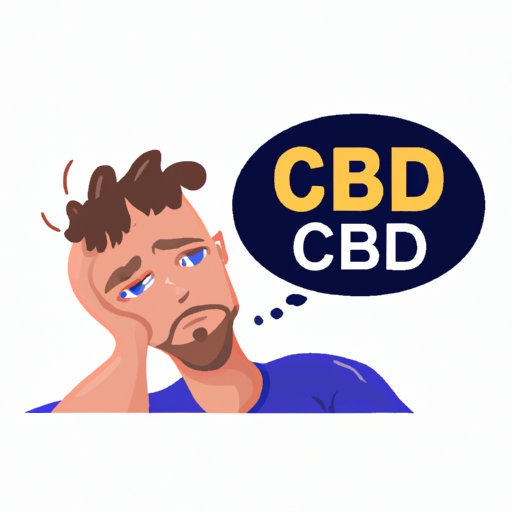
Introduction
Cannabidiol, or CBD, has gained significant attention in recent years for its potential health benefits. One of the areas where CBD has shown promise is in improving sleep quality. However, with this increased interest comes questions about whether CBD makes you tired. In this article, we explore the link between CBD and sleep, debunk common misconceptions, and provide tips for finding the right dosage to achieve the desired effects.
Exploring the Sleep-Promoting Effects of CBD: What Research Says
Research into the effects of CBD on sleep is still in its early stages, but some scientific studies have shown promising results. A 2019 study published in The Permanente Journal found that CBD may have a positive impact on sleep and anxiety in some people. The study tracked 72 adults with anxiety and poor sleep quality and found that anxiety scores decreased in 79.2% of patients, and sleep scores improved in 66.7% of patients.
Another study conducted in 2017 found that CBD may increase total sleep time and improve the quality of sleep in people with insomnia. The study found that the administration of 160 mg of CBD resulted in less difficulty falling asleep and staying asleep during the night compared to a placebo.
CBD and Fatigue: Debunking Common Misconceptions
One of the common misconceptions about CBD is that it causes fatigue or drowsiness. However, this is not necessarily the case. While CBD may have a calming effect, the compound does not typically cause drowsiness or fatigue in most people. In fact, some studies have highlighted that CBD may help to promote wakefulness and alertness.
CBD vs. THC: Which Compound Is More Likely to Make You Feel Sleepy?
THC, the psychoactive component found in marijuana, is well-known for its potential to cause drowsiness and promote sleep. In contrast, CBD is not psychoactive and does not produce the same sedative effects. However, the two compounds have different mechanisms of action and may affect wakefulness differently.
THC engages with the CB1 receptor in the endocannabinoid system, which is the primary system that controls sleep and wakefulness. CB1 activation can cause sleepiness and fatigue. In contrast, CBD does not bind to the CB1 receptor in the same way and may not have the same sedative effect.
The Impact of CBD Dosage on Drowsiness: Finding the Right Balance
The dosage of CBD can affect feelings of drowsiness or alertness. In general, lower doses of CBD are more likely to have a stimulating effect, while higher doses may promote relaxation and calmness.
Finding the optimal CBD dosage will depend on individual factors, such as age, weight, and sensitivity to CBD. It is also essential to consider the timing of CBD administration, as taking CBD too close to bedtime may have a more significant impact on sleep.
Insomnia and CBD: How This Natural Remedy May Help Improve Sleep Quality
CBD may be a potential treatment option for insomnia, a sleep disorder characterized by difficulty falling or staying asleep. CBD interacts with the endocannabinoid system, which controls sleep and wakefulness. By modulating the endocannabinoid system, CBD may help to improve sleep quality and duration.
One of the significant advantages of CBD as a sleep aid is that it does not produce the same risks or side effects as many conventional sleep medications. CBD is generally well-tolerated, and studies indicate that it does not produce the same addictive properties or tolerance that can occur with pharmaceutical sleep aids.
From Athletes to Insomniacs: Real People Share Their Experiences With CBD-Induced Drowsiness
While scientific research provides evidence for the effects of CBD on sleep, anecdotal evidence can also provide valuable insights into how CBD affects people in real-life situations. Many people who have used CBD for sleep purposes have reported experiencing improved sleep quality without feeling excessively drowsy or fatigued the following day.
Some professional athletes have also reported using CBD to help with sleep and recovery. For example, UFC fighter Nate Diaz caused a stir in 2016 when he admitted to using CBD after a fight to reduce inflammation and improve sleep quality.
Conclusion
In conclusion, CBD has shown promise as a potential treatment for improving sleep quality. While it does not typically make people feel excessively drowsy or fatigued, it is essential to find the optimal dosage and timing of administration to achieve the desired effects. Overall, CBD is a safe and non-addictive option for those looking to improve their sleep quality naturally.





